Dear Commons Community,
The U.S. Treasury issued a report last week entitled, “The-Economics-of-Childcare-Supply,” that characterized the U.S. child care system as “unworkable.” The report commented that:
“The average American family with at least one child under age 5 uses 13% of their income to pay for child care, according to the report, nearly double the 7% that the U.S. Department of Health and Human Services considers affordable.
Additionally, less than 20% of the children eligible for the Child Care and Development Fund — a federal assistance program for low-income families — are getting that funding.”
“Child care is a textbook example of a broken market, and one reason is that when you pay for it, the price does not account for all the positive things it confers on our society,” Treasury Secretary Janet Yellen said in a statement upon release of the report . “When we under invest in child care, we forgo that; we give up a happier, healthier, more prosperous labor force in the future.”
One failure, according to the report, is that parents must pay for care early in their careers when they are earning less and shouldering student loan and mortgage payments. Additionally, child care providers are challenged by low revenue and high turnover of low wage workers.
“The United States has a severe child care shortage,” Yellen said. “The child care centers that do exist are often in disrepair, operating on razor-thin margins, with workers whose wages keep them at the edge of poverty.”
‘An overdue, and critical investment’
Over half of Americans live in so-called child care deserts, or areas where there are three children per every child care opening, according to the Center for American Progress (CAP). Low-income and rural families are more likely to live in such areas.
“There’s a massive supply problem underpinning this,” Laura Dallas McSorley, senior director of Early Childhood Policy at CAP, told Yahoo Money. “There’s no meaningful access for children and families to access high quality childcare, much less affordable childcare.”
To address these issues, the Biden administration and Democrats propose a major investment in the child care system as part of the $3.5 trillion infrastructure package moving through Congress. Those include universal preschool and child-care subsidies for low-income families.
“What’s in front of Congress right now is an overdue and critical investment in building an early childhood system that will work for kids and families,” Dallas McSorley said. “We really haven’t had as broad of an investment, given the opportunity.”
‘Contribution to economic growth’
The universal preschool proposal would increase access to free, high-quality child care for all 3- and 4-year-olds. The program would also include higher wages for early childhood educators.
As a way to cut the cost for child care, the plan suggests upgrading existing facilities and building a supply of child care in high-need areas as well as boosting compensation for child care workers.
The two main proposals would cost $450 billion in total over a decade.
“In many states, you have to be very low income to be eligible for childcare assistance, and frequently it doesn’t even actually cover the full cost,” Rasheed Malik, associate director of research for Early Childhood Policy at the Center for American Progress, told Yahoo Money. “The legislation is a total change there.”
On top of those two proposals, the infrastructure package includes a national paid family and medical leave program as well as permanently extending the expansion of the Child and Dependent Care Tax Credit (CDCTC) that allows taxpayers to deduct expenses incurred for child care.
“It’s past time that we treat child care as what it is – an element whose contribution to economic growth is as essential as infrastructure or energy,” Yellen said. “Enacting them is the single most important thing we can do to build a stronger economy over the next several decades.”
Good work by the Treasury Department!
Tony



